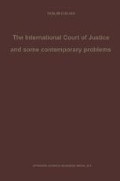Abstract
In the Nationality Decrees in Tunis and Morocco,1 there was a dispute between France and Great Britain regarding the Nationality Decrees issued in Tunis and the French zone of Morocco on 8 November 1921, and their application to British subjects, the French Government having refused to submit the legal questions involved to arbitration. The case was referred to the Permanent Court of International Justice for its advisory opinion on the question of whether the dispute in question was or was not by international law solely a matter of the domestic jurisdiction under Article 15, paragraph 8, of the League Covenant. The Council noted that the two Governments had agreed that, if the opinion of the Court upon the question was that the question was not solely a matter of domestic jurisdiction, the whole dispute would be referred to arbitration or jurisdiction under conditions to be agreed between the two Governments.
Access this chapter
Tax calculation will be finalised at checkout
Purchases are for personal use only
Preview
Unable to display preview. Download preview PDF.
References
P.C.LJ. Series,No. 4.
Article 15, paragraph 8, of the Covenant.
The term “a matter which in international law is solely within the jurisdiction of that party” is not synonymous with sovereignty. It is intended to indicate matters which, though they closely concern the interests of more than one State, are not, in principle, regulated by international law.
Whether a matter is solely within the jurisdiction of a State is a relative question. It depends on the stage of the evolution of international law, relation and organization.
On the whole subject of matters within the domestic jurisdiction of States, see the summary of the findings of the Permanent Court of International Justice by Schwarzen-berger, in International Law,VoL 3, at p. 230: “The purpose of the exemption clause of Article 15 (8) is to give preference at the point defined in this clause to the principle of sovereignty over that of collective action.”
In the League system, the reservation of domestic jurisdiction under Article 15 (8) is the exception to the rule of the submission to the jurisdiction of the League of disputes which are not submitted to arbitration. Thus, this clause is not to be extensively interpreted.
Compare these propositions with the provisions of Article 2, paragraph 7 of the United Nations Charter.
Oscar Chinn, P.C.LJ. Series C,No. 75, p. 65.
P. C.LJ. Series A/B, No. 74, p. 10.
I.C.J. Reports 1950,p. 59.
By a capitulatory régime was meant a system resulting from special arrangements by treaty whereby foreigners, mainly from Western European countries, who were resident in certain Asian and African countries, enjoyed immunity from the local jurisdiction within the territory of the State in civil and criminal matters, and were subject only to the jurisdiction of the Consular Courts of their home State and subject to its municipal law. In the case of Egypt, until 1937 civil and criminal matters and some police offences were subject to the jurisdiction of international courts called Mixed Courts, although in other criminal matters these foreigners were subject to the jurisdiction of their own courts. As a result of the Conference held in Montreux in April 1973, Great Britain, the United States and a number of other Powers agreed to the aboliton of the capitulations, while providing for an transitional period of 12 years during which certain cases involving foreigners were to be tried by Mixed Courts composed of Egyptian and other foreign nationals. Another Convention was signed between Great Britain and France for the abolition of British capitulatory rights in the French zone of Morocco and also in Zanzibar. It may be noted also that capitulatory régimes in certain Asian and African countries were gradually abolished, for instance, in Japan in 1899, in Turkey in 1914 and 1923, and in China only on 11 January 1943, when Great Britain and the United States signed treaties with China relinquishing extraterritorial rights in that country. The régime of capitulations was abolished in Ethiopia only in 1936. Finally, capitulatory régimes are now a thing of the past. See Lauterpacht, International Law: A Treatise, Vol. I, 8th ed., London, 1955, pp. 682–686.
I. CJ. Reports 1951,p. 109 and I.C.J. Reports 1952,p. 176.
Rights and permissions
Copyright information
© 1983 Springer Science+Business Media Dordrecht
About this chapter
Cite this chapter
Elias, T.O. (1983). The era of protectorates, colonies and capitulations. In: The International Court of Justice and some contemporary problems. Springer, Dordrecht. https://doi.org/10.1007/978-94-017-4865-0_16
Download citation
DOI: https://doi.org/10.1007/978-94-017-4865-0_16
Publisher Name: Springer, Dordrecht
Print ISBN: 978-90-247-3044-5
Online ISBN: 978-94-017-4865-0
eBook Packages: Springer Book Archive

